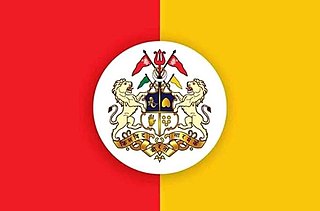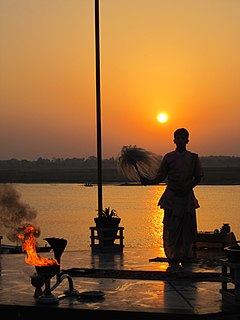
Tripura is a state in northeastern India. The third-smallest state in the country, it covers 10,491.69 km2 (4,050.86 sq mi) and is bordered by Bangladesh to the north, south, and west, and the Indian states of Assam and Mizoram to the east. In 2011 the state had 3,671,032 residents, constituting 0.3% of the country's population.

Agartala is the capital city of the Indian state of Tripura, and is one of the largest cities in northeast India. The city is governed by the Agartala Municipal Corporation. The city is the seat of the Government of Tripura. It is located on the banks of the Haora River, near the Bangladesh border, about 90 kilometres (55 mi) east of Bangladesh's capital Dhaka and about 2,499 km (1,522 mi) from the national capital New Delhi. Agartala is being developed under the Smart Cities Mission, a flagship scheme of the Government of India.

The Tripura Baptist Christian Union (TBCU) is the largest Christian denomination in the Indian state of Tripura. It has its head office in Agartala, the state capital. The TBCU is affiliated to the Asia Pacific Baptist Federation (APBF) and the Baptist World Alliance (BWA). It is also a member church in the North East India Christian Council (NEICC), a regional church body of the National Council of Churches in India (NCCI). As of 2020, TBCU had 84,795 members in 943 churches.

The State of Tripura has a long history. The Twipra Kingdom at its peak included the whole eastern region of Bongal from the Brahmaputra River in the north and west, the Bay of Bengal in the south and Burma to the east during the 14th and 15th centuries AD.

The Tripuri are an ethnic group originating in the Indian state of Tripura. They are the original inhabitants of the Twipra/Tripura Kingdom in North-East India and Bangladesh. The Tripuri people through the Manikya dynasty ruled the Kingdom of Tripura for many years until the kingdom joined the Indian Union on 15 October 1949.
Kokborok(Tiprakok/Tripuri) is the native language of Tripuri people in present Tripura state in North East of India. During 20th centuries many of Royal family and its officials contributes to develop the Kokborok Language in many ways.
Rajmala is a chronicle of the Kings of Tripura, written in Bengali verse in the 15th century under Dharma Manikya I.

Debbarma The DebBarma is the one of the clan of Tripuri community, predominantly in Tripura state, India and Bangladesh, they speak Kokborok which is Tibeto-Burman languages. They belong to Kshatriya varna.
Twipra Kingdom was one of the largest historical kingdoms of the Tripuri people in the North-east India.

Kirit Pradyot Manikya Deb Barma Bahadur is an Indian political activist. He is the current head of Tripura Royal Family and is the 186th King Titular. He was born in Delhi, and now resides in Agartala, Tripura. He also served as the editor of TNT-The Northeast Today. He is the current chairman of The Indigenous Progressive Regional Alliance also known as TIPRA.He is known as 'Bubagra' among his people and is one of the active voice for the rights of Indigenous Tripuri people of Tripura.

Neermahal is a former royal palace built by Maharaja of Tripura Kingdom Bir Bikram Kishore Manikya bahadur of the erstwhile Kingdom of Tripura, India in the middle of the lake Twijilikma in 1930 and was completed by 1938. It is situated in Melaghar, 53 kilometers away from Agartala, the capital of Tripura. The palace is situated in the middle of Rudrasagar Lake and assimilates Hindu architectural style

The Ujjayanta Palace is a museum and the former palace of the Kingdom of Tripura situated in Agartala, which is now the capital of the Indian state of Tripura. The palace was constructed between 1899 and 1901 by Maharaja Radha Kishore Manikya Debbarma and stands on the banks of two lakes surrounded by gardens inspired by the European style. It was the home of the ruling Manikya dynasty until Tripura's merger into India in October 1949. The palace was purchased from the royal family by the Government of Tripura in 1972–73 for Rs. 2.5 million, and used to house the State Legislative Assembly until July 2011. Ujjayanta Palace is now a State Museum and it primarily showcases the lifestyle, arts, culture, tradition and utility crafts of communities residing in northeast India, along with a lot of stone sculptures, coinage of the Manikya dynasty and some other artifacts.
Manipuri Kshatriya, also known as the Meitei Kshatriya is a Hindu Meitei caste in the state of Manipur, India.

Ganga puja is a religious festival of the northeastern state of Tripura in India. The tribal Tripuri people worship the Goddess of the river, and pray to be saved from epidemic diseases and for the well-being of pregnant women. The celebration involves building a temple of bamboo in the middle of the river or a water stream. The River Ganges, known locally as Ganga, is one of the fourteen prime deities worshipped in this region. The festival is popularly celebrated throughout the state somewhere in March, April or May, with its date fixed according to the Hindu Lunisolar calendar. The 2018 date is 24 May.
Elections in Tripura have been conducted since 1952.

Tripura State, also known as Hill Tipperah, was a princely state in India during the period of the British Raj and for some two years after the departure of the British. Its rulers belonged to the Manikya dynasty and until August 1947 the state was in a subsidiary alliance, from which it was released by the Indian Independence Act 1947. The state acceded to the newly independent Indian Union on 13 August 1947, and subsequently merged into the Indian Union in October 1949.
Atul Debbarma is an Indian doctor-turned-politician and author. He was a practicing doctor in the Municipal Corporation of Delhi until December 2017. He became involved with Rashtriya Swayamsevak Sangh (RSS) and its different wings such as Vanvasi Kalyan Ashram and Vivekananda International Foundation in 2007. He won the Tripura Assembly Elections 2018 as the BJP candidate from Krishnapur constituency.

Maharaja Kirit Bikram Kishore Deb Barman was 185th and last King of Tripura, a princely state in northeastern India. His formal coronation was held in 1941 but he could never become the king.
Sudhanwa Debbarma was an Indian Kokborok writer, Political leader and member of the Communist Party of India (Marxist). He was the former Speaker of Tripura Legislative Assembly. He was the veteran leader of Ganamukti Parishad. He was a member of Tripura Legislative Assembly from Takarjala (1977-1988).











